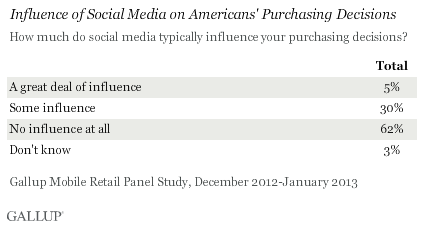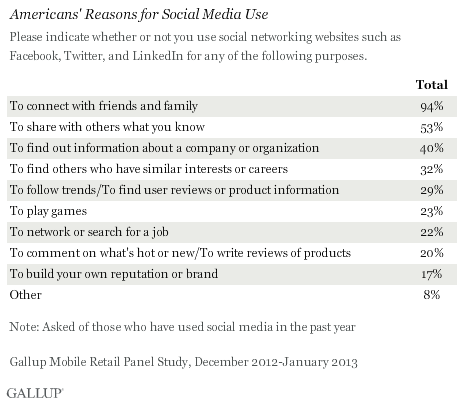According to a press release I have just received from Gallup "Americans say Social Media Have Little Sway on Purchases". A 'Web and mail study of 18,525 U.S. adults, aged 18 and older,' apparently discovered that "A clear majority of Americans say social media have no effect at all on their purchasing decisions. Although many companies run aggressive marketing campaigns on social media, 62% in the U.S. say Facebook and Twitter, among other sites, do not have any influence on their decisions to purchase products."

The number of respondents to the survey is impressive, and Gallup is a highly experience and reputable organisation, but before you rethink all your marketing strategies, it is worth pausing to consider the methodology of the research. The question Gallup asked was "How much do social media typically influence your purchasing decisions?". To which 5% replied "A great deal of influence" and 30% said "Some influence".
Now I'd like you to do a bit of research - on yourself. How would you have answered that question? What do you think of when you see the words 'social media'? Actually, unless you are involved in marketing or media, how often do you ever use the expression 'social media' anyway. When you last checked your Facebook account or sent a tweet did you say to yourself "I'm doing some social media"? Gallup might, just as usefully have asked ""How much do public relations or advertising typically influence your purchasing decisions?". How sensibly - and accurately can anybody really judge the influence a clever campaign can have; after all, the whole point of some of the best campaigns is not to be noticed. It was no accident that, as long ago as 1957, Vance Packard called his (great) book on advertising 'The Hidden Persuaders"
Social media - as Gallup should know - encompasses a bewildering array of places and ways in which human beings now communicate with each other. Tripadvisor is part of social media; so are the reviews on Amazon and almost every other retail website; and so is Mumsnet and the professional photographer's forum my partner sometimes dips into (and certainly takes note of when wondering about which new lens to buy); and so are Jancis Robinson's and Robert Parker's and Jamie Goode's websites, especially if you take account of the responses they feature from readers.
When you start to include all of these, I'd reckon that the answers might be a little different, What if, Gallup had, for example, asked "If you were looking at purchasing a washing machine on a website where 100 people had given it an average mark of 2 stars and, in many cases made detailed negative remarks about its reliability, might this, just, possibly, make you reconsider your choice?
And what if the pollsters had said "Are you really 100% sure that those gorgeous pictures your friend posted of their holiday in Corfu, and the comments they made about the amazing cheapness of everything there, didn't even slightly make you think of going there?".
Most surveys concur that the biggest reason the majority of people choose to do anything is the recommendation of friends and family - the very people Gallup's respondents say they connect with on 'social networking websites such as Facebook, Twitter and Linkedin'. Is it just conceivable that, in some of the communication between all these friends and family members, there might not be some mention of products and services they have used and liked?
Most surveys concur that the biggest reason the majority of people choose to do anything is the recommendation of friends and family - the very people Gallup's respondents say they connect with on 'social networking websites such as Facebook, Twitter and Linkedin'. Is it just conceivable that, in some of the communication between all these friends and family members, there might not be some mention of products and services they have used and liked?
Yes, social media is sometimes overhyped - like lots of other things. But today it is part of most people's daily lives; taken for granted in much the same way that we take cars, trains, planes and buses.
To be fair to Gallup, whose headline strikes me as nonsense, its release does include some sensible commentary: "Companies that engage their customers -- by providing exceptional service and a pleasurable in-store experience -- will, in turn, drive those customers to interact with them on social media. Simply promoting products and services on Facebook or Twitter is unlikely to lead to sales... However, companies can use social media to engage and boost their customer base."
In other words, don't simply rely on social media to build your sales. You also need to offer a decent product and service. Thank goodness Gallup pointed that out.



















